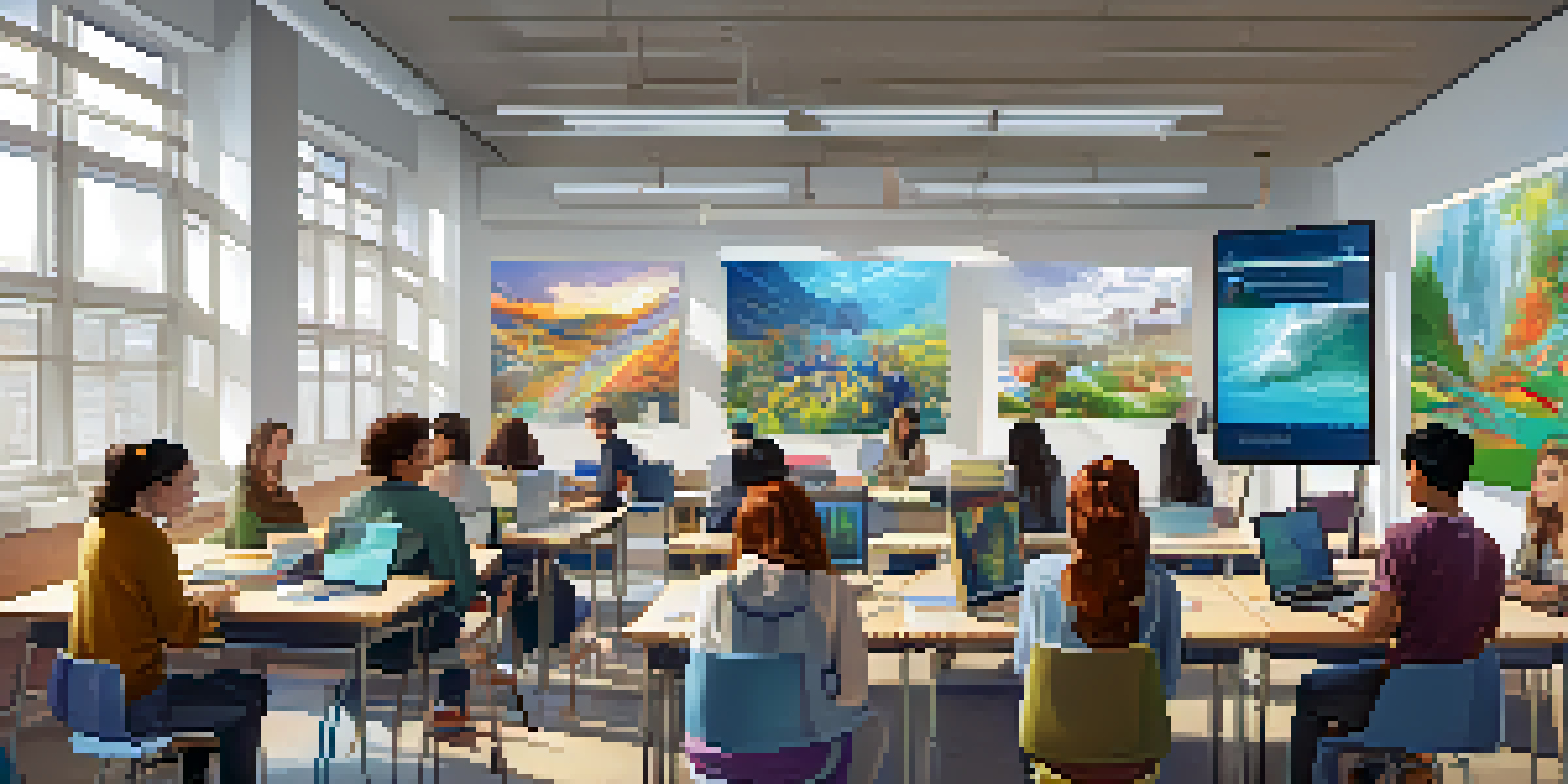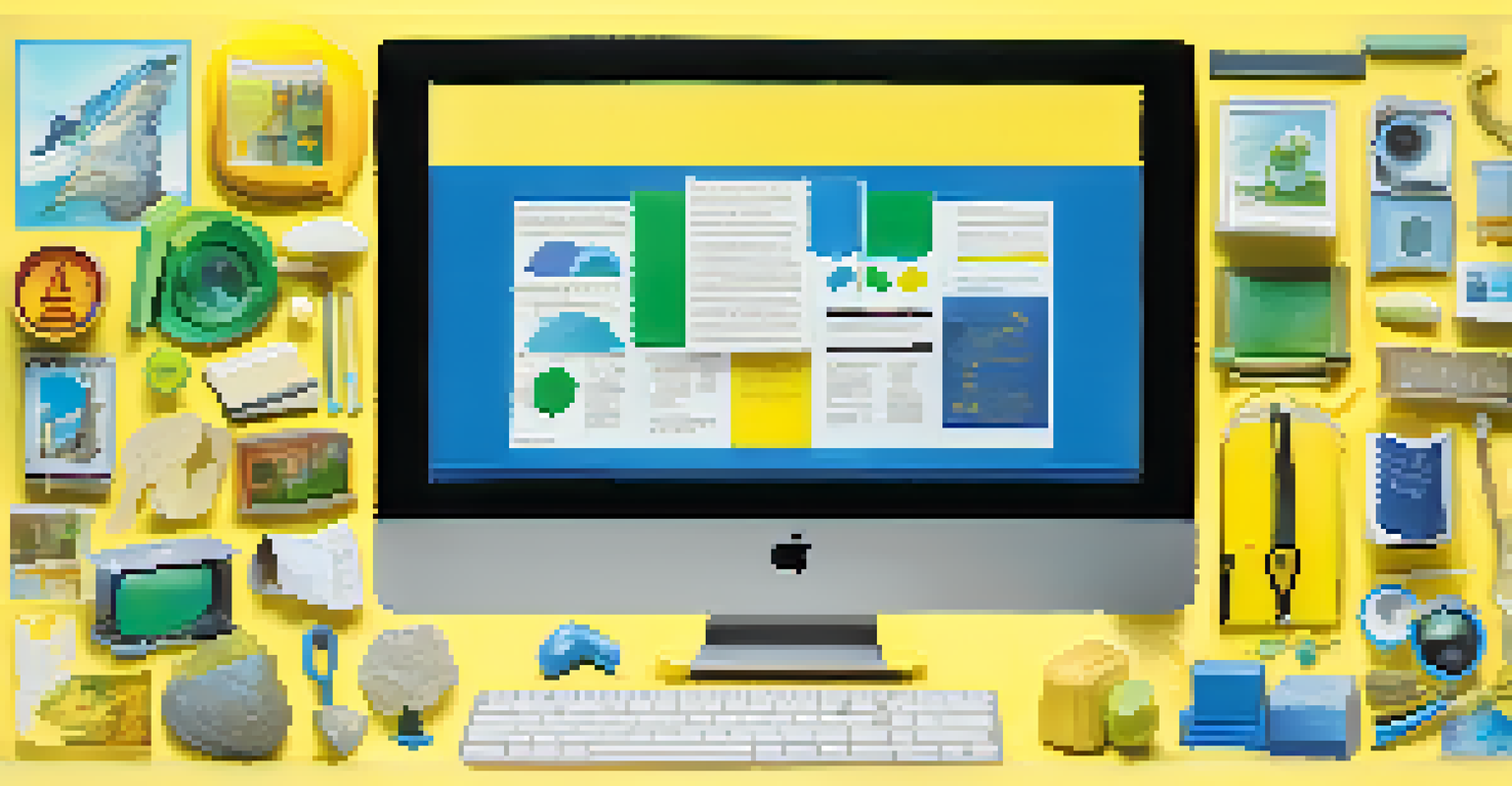The Role of Online Collections in Student Learning Progress

Understanding Online Collections in Education
Online collections refer to digital repositories that house a variety of educational resources, including articles, videos, and interactive tools. These resources can be accessed anytime, anywhere, making learning more flexible and accommodating to students' diverse needs. For example, a student struggling with a math concept can find a video tutorial in an online collection that explains it in a different way, potentially leading to better understanding.
The great aim of education is not knowledge but action.
The role of these collections is increasingly significant in today’s digital age, where traditional textbooks may not always suffice. They provide a wealth of information that caters to various learning styles, whether visual, auditory, or kinesthetic. By tapping into this vast pool of resources, students can engage with content that resonates more with them, enhancing their overall learning experience.
Moreover, online collections often feature curated content, ensuring that students have access to high-quality materials. This curation is especially beneficial in fields like science or history, where accurate information is crucial. As students navigate these collections, they not only gather knowledge but also learn to discern credible sources, a vital skill in the digital landscape.
Enhancing Research Skills Through Online Collections
One of the standout benefits of online collections is the opportunity they provide for students to enhance their research skills. By exploring various digital resources, students learn how to locate, evaluate, and synthesize information from multiple sources. This process is invaluable in academic settings, where strong research skills can make or break a project.

For instance, a high school student working on a history project might use an online collection to find primary sources, articles, and expert interviews. As they sift through different materials, they practice critical thinking by assessing the relevance and reliability of each source. This experience not only aids in their current project but also equips them with skills they will need in college and beyond.
Flexible Learning with Online Resources
Online collections provide diverse educational materials that cater to various learning styles and needs, enhancing accessibility and engagement.
Additionally, online collections often include tools that help students organize their research, such as citation generators or note-taking apps. These features streamline the research process, making it more efficient and less daunting. As a result, students can focus more on analyzing and understanding the content rather than getting bogged down by administrative tasks.
Fostering Collaboration Among Students
Online collections also play a crucial role in fostering collaboration among students. Many of these platforms allow for shared access to resources, which encourages teamwork and the exchange of ideas. When students work together on projects, they can draw from the same collection, promoting discussions and deeper learning.
Education is the most powerful weapon which you can use to change the world.
For example, a group of students might collaborate on a science fair project using an online collection to gather data and visuals. As they share their findings and insights, they not only learn from the content but also from each other’s perspectives. This collaborative spirit can lead to richer, more innovative outcomes than if they were working independently.
Moreover, some online collections incorporate discussion boards or forums where students can engage with peers and educators. This interaction often leads to valuable feedback and support, enhancing the learning experience. As students communicate and debate ideas, they develop a sense of community, which is essential for effective learning.
Individualized Learning Paths with Online Collections
Online collections allow educators to create individualized learning paths for their students. By providing a range of resources that cater to different levels of understanding, teachers can tailor their approach to meet each student's needs. This personalization is crucial in a diverse classroom where students may be at varying stages of learning.
For instance, a teacher might recommend specific articles or videos from an online collection based on a student’s performance or interests. This targeted approach not only helps students grasp challenging concepts but also keeps them engaged. When learning is aligned with their interests, students are more likely to take ownership of their education.
Enhanced Research Skills Development
Students improve their research skills by navigating online collections, allowing them to evaluate and synthesize information effectively.
Additionally, the flexibility of online collections means that students can explore topics at their own pace. If a student needs more time to understand a concept, they can revisit resources as needed. This autonomy fosters a sense of responsibility and encourages lifelong learning habits.
Increasing Engagement Through Interactive Resources
One of the most exciting aspects of online collections is the availability of interactive resources that boost student engagement. These might include quizzes, simulations, or gamified learning experiences that make education fun and dynamic. When students interact with the material, they're more likely to retain information and feel motivated to learn.
For example, an interactive chemistry simulation in an online collection allows students to experiment with chemical reactions virtually. This hands-on approach not only deepens their understanding but also sparks curiosity and enthusiasm for the subject. Engaged students are often more willing to tackle complex topics and participate in class discussions.
Furthermore, interactive resources often provide instant feedback, which is crucial for learning. Students can assess their understanding in real-time and make adjustments to their study strategies accordingly. This immediate response creates a safe environment for exploration, where mistakes are viewed as learning opportunities rather than setbacks.
Supporting Diverse Learning Needs with Online Collections
Online collections are particularly valuable in supporting diverse learning needs within the classroom. They offer a range of formats and levels, enabling students with different abilities to access materials that suit their learning style. This inclusivity is essential for creating an equitable educational environment.
For instance, students with learning disabilities may benefit from audio recordings or visual aids available in online collections. These resources can make complex information more digestible, allowing all students to participate fully in their education. By accommodating different learning preferences, educators can help ensure that no student is left behind.
Support for Diverse Learning Needs
Online collections offer inclusive resources that accommodate different abilities and learning preferences, fostering an equitable educational environment.
Moreover, online collections often feature resources in multiple languages or with culturally relevant content. This diversity not only supports language learners but also enriches the learning experience for all students. When students see themselves represented in the materials, it fosters a sense of belonging and encourages engagement in their studies.
Preparing Students for a Digital Future
Finally, online collections prepare students for a digital future, equipping them with the skills they need to thrive in an increasingly technology-driven world. As students navigate digital resources, they become proficient in using various tools and platforms. This digital literacy is essential for success in both higher education and the workforce.
For example, by learning how to conduct effective online searches or evaluate digital content, students become savvy consumers of information. They develop critical thinking skills that enable them to discern fact from fiction, a crucial skill in today's media landscape. These competencies are not only valuable academically but also in everyday life.

Additionally, familiarity with online collections can inspire students to become lifelong learners. As they discover how to access and utilize resources independently, they gain the confidence to seek out knowledge beyond the classroom. This self-directed approach to learning is key to adapting in a fast-paced, ever-changing world.